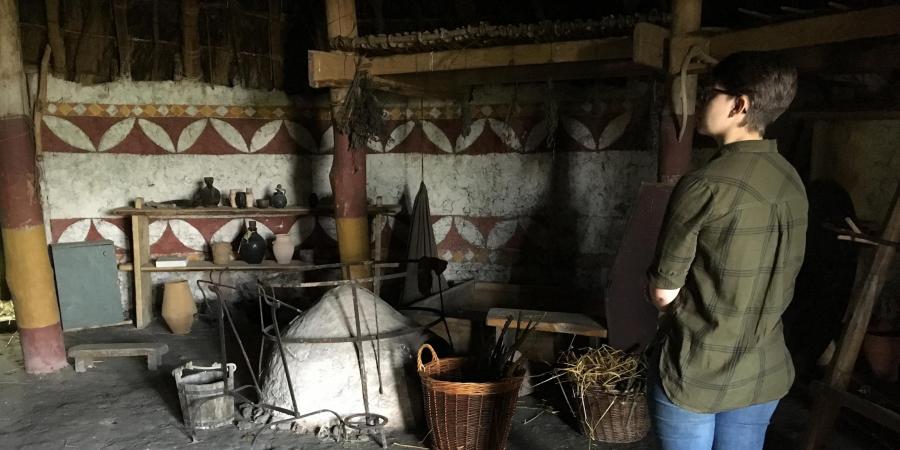I am currently on my gap year, intending to study History and Archaeology at the University of Exeter starting in September. When I discovered that Wessex Archaeology offers work experience programmes, I was immediately enthusiastic.
On my first day, Community Engagement Assistant Beth gave me the grand tour of the building and introduced me to the people with whom I would be spending my week. Everyone was very welcoming and enthusiastic to help me learn more about what exactly goes on in the world of commercial archaeology.
I spent some time talking skeletons with Emma Robertson, an Osteoarchaeologist. She showed me the remains she was working on and explained to me in layman’s terms what she had to do.
In the afternoon I helped set up a talk with dementia patients from the Salisbury Men’s Rugby Club.
Everyone I met was incredibly kind and happy to explain what they were doing. A good start to an exciting week!
Environmental archaeology
I spent Monday helping in the Environmental department. Jenny Giddins showed me the ropes of the floatation tanks and let me try on my own. It was messy, and extremely fun. It was very satisfying to discover what was hiding in what looked like an ordinary bucket of dirt. Things like flint, charred seeds, bone fragments…
After finishing the “wet part”, we started sorting the residue to see if there was anything of interest (which there most definitely was). We found an enormous animal tooth in very good condition and loads of tiny bits of pottery, fired clay, bone and flint.
In the afternoon, I got to use the microscope to look at the smaller pieces of residue (smaller than 1 mm!) and try and determine what I was looking at. It wasn’t easy, but I managed to sort the tiny bits and pieces into little petri dishes, without getting too distracted by how ordinary gravel looks under a microscope.
I enjoyed being able to work with my hands (and getting them very dusty in the process) and look for ancient leftovers of our ancestors. It is a very satisfying job.
Coastal & Marine
I spent Tuesday with the Coastal & Marine team. If I thought Enviro was messy work, I was about to learn that things could get a lot messier.
I spent the day cleaning and recording old timber from a shipwreck with Kerree Kendall. We started by removing all of the old dirt and dust from the wood with a brush (much harder than it looks!).
Then we filled in the context sheet: measure the planks, determine what kind of wood they were made of, and note any abnormalities like nails and saw marks.
After that, I had to sketch and photograph the plank. I was afraid it would not be very good (I am not very skilled at drawing), but it turned out alright.
Cleaning and carrying around timber is definitely a good workout!
Graphics Office and Heritage
Karen Nichols, the Graphics Manager, explained to me what the Graphics Department does. It was fascinating to hear how they constantly adapt to new technologies, while also still using traditional methods. I was stunned by the skill that is needed for the incredibly detailed drawings by the illustrators.
After that, I spent the rest of my day with the Heritage team. Team members talked with me about how their job works and how important planning and the desk-based assessments are. Clare King, the Principal Consultant, gave me some very useful resources to use at University.
The Heritage team was incredibly kind and helpful; I really enjoyed spending my afternoon with them!
Geophysics
Thursday, I met the Geophysics teams.
The Marine Geophysics team explained to me how their kit works, which I thought was incredibly interesting as I am a bit of a science buff. Sophie Thorogood, an Exeter alumna, told me about both her experiences as a student, and about how she uses her fascinating tech to observe the bottom of the sea.
Tom King (from the Terrestrial Geophysics team) explained the differences between marine and terrestrial geophysics and showed me some photos and graphs from his dissertation, which was very interesting!
At noon, I went back to the Heritage team to speak with Bob Davis, a Senior Heritage Consultant, about what he does. He showed me some projects that he was working on, and taught me some fun trivia about World War II graffiti.
In the afternoon Sam, Beth, Karen, Ben and I went to the Ancient Technology Centre to see if it would be possible to collaborate with them sometime in the future.
Overall, doing a week of work experience at Wessex Archaeology was a really fun and enriching experience. I enjoyed meeting everyone and learning about how this company functions. Huge thanks to everyone who helped me this week and to Beth and Sam, who were so kind to organise this.
By Emily Geilenkotten, Student
